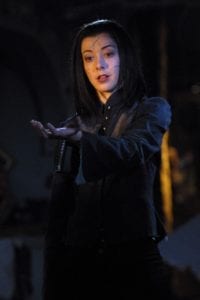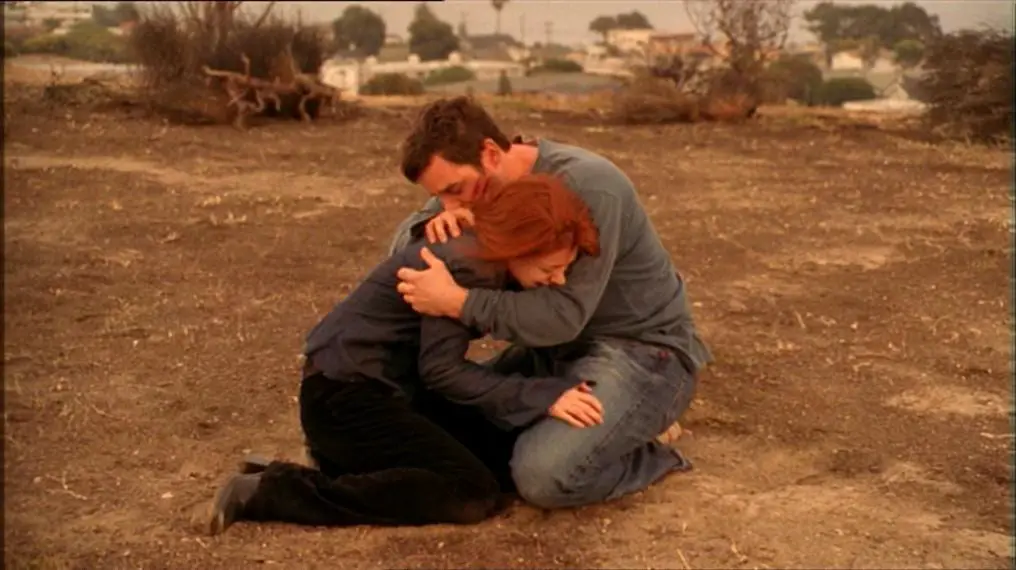WARNING
Massive spoilers for both Game of Thrones and Buffy the Vampire Slayer.
I know the title of this article is baffling. I was baffled when I came up with it. I would have never thought to compare Game of Thrones with Buffy the Vampire Slayer. They are immensely different shows.
Then, quarantine brought with it a re-watch of Buffy. It hit me just as I was watching a young, fresh-faced Willow Rosenberg trying magic for the first time; young, naïve, the most vulnerable of the core three. Seeing her, I thought “wow, to think she turns into Dark Willow eventually”. And then it hit me. I couldn’t stop thinking about young Daenerys, also naïve and vulnerable, and her shift into Mad Queen Daenerys at the end of Thrones.
Back in the day, circa 2005, when I got into Buffy, Dark Willow was one of my favorite twists in Buffy, despite my beef with some of the aspects of the season it was a part of (the sixth). Looking at it now, I find it still holds up. Mad Queen Daenerys, though, started aging badly for me since before she came into the screen. I could smell it coming and I knew I wouldn’t like it.
It was almost as if I could sense the anniversary of “The Bells” coming up. I swear, it was unplanned. Like a sign of the universe, and on the day the infamous next-to-last episode of Game of Thrones turns one, I am here to analyze these two storylines and hold them up next to each other. What makes Dark Willow work for me (and many others)? Why did Mad Queen Daenerys get such a strong negative reaction (not just from me)?
Both are sympathetic characters viewers get behind. Both snapped in an instant and caused death, planned more destruction before they had to be stopped by their loved ones. One worked for me, one really did not. I think it comes down to three main aspects: Character and point of view, story arc and foreshadowing, and framing. Buckle up, everyone, this is going to be a long one.
Dark Willow
This is for the Thrones watchers who didn’t watch Buffy. If you have, you can skip to the last paragraph of this section.

Buffy the Vampire Slayer aired from 1997 to 2003, and focused on Buffy Summers, a teenager who is also the Slayer, a “chosen one” to kill the vampires and demons of the world. For its run, the show focused more on the human, real-life problems of its protagonists, from teens to adulthood, and used the monsters as vehicles to externalize those issues.
Willow Rosenberg was one of Buffy’s two best friends and sidekicks. She starts out a nerdy, shy girl who gets teased constantly at school. Throughout the story, Willow comes into herself, learns magic and becomes a witch, and one of the most powerful characters in the Buffy universe.
Season six was the show’s penultimate season. While there was often a “big bad” in the form of super vampires, demons or gods from other dimensions, season six featured The Trio, a threesome of “nerds” who got into magic and decided they would bring the Slayer down as part of a petty power trip. It was underwhelming for a lot of the fans. Then, in the last three episodes of the season, the second (and some would say the real) big bad is revealed: Dark Willow.
After dabbling in magics more advanced than she was ready for in season 5 out of necessity, Willow goes through a magic addiction storyline in season six. It leads her to do several questionable-to-horrible things. Most notably, she chooses to erase her girlfriend Tara’s memory about a fight instead of dealing with it. It culminates in causing a car crash while with Dawn, a minor and Buffy’s little sister. She (understandably) loses her relationship with Tara as well as her friends’ trust, but all of them are willing to support her recovery.
She does get better, little by little through the course of 9 episodes. She struggles to give up her magic equipment, and to get back into the old way of doing her Scooby (the name of Buffy’s team) work. Her recovery is clear to the people around her, including Tara, who chooses to rekindle their relationship. Moments after this, Tara is hit with a stray bullet directly through the heart which kills her instantly, and Willow snaps.
Tara’s death is a whole subject on its own, which has caused controversy since it happened. Today I am not here to talk about Tara, it is a subject for another day. So, for the purpose of this article, I will refer to Tara’s death only in terms of Willow’s story—which, I know. Trust me, I know.
Mad Queen Daenerys
This is for the Buffy watchers who didn’t watch Thrones. If you have, you can skip it.
Game of Thrones aired on HBO from 2011 to 2019, and it is an adaptation of George R.R. Martin’s series A Song of Ice and Fire. It focuses on several characters across two continents, one of the most prominent being Daenerys Targaryen. The daughter of the overthrown Targaryen king, Daenerys starts the story young, shy, and vulnerable. Her older brother Viserys sells her off to Khal Drogo, “king” of the Dothraki in exchange for an army to defend her older brother’s claim to the throne.
After the death of her brother and husband, and the birth of her three dragons she considers children, Dany sets off on to claim the throne for herself. She grows into herself and establishes who she is as a ruler. She frees the slaves and kills the slavers of two major cities in the eastern kingdom of Essos and renounces the traditions of the Dothraki.

During season seven, Dany finally arrives at Westeros to start her conquest, which she interrupts when she discovers there is an army of White Walkers and Wights (ice zombies, basically) marching on all of Westeros. If she doesn’t fight that first, her conquest will be for nothing. In the meantime, she falls in love and becomes involved with Jon Snow, the King in the North, who bends the knee to her rule. Neither of them knows he is secretly a Targaryen, her nephew with a better claim to the throne.
She finds that the Westerosi do not take to her immediately as she has been promised by her advisors, and through the last season, she suffers loss after loss in her slow advance to the capital. Jon tells her he is a Targaryen soon before she loses Jorah, her oldest friend and advisor, who dies in the battle against the Night King. Then Rhaegal, her dragon, is killed and her closest friend, Missandei is taken. She is later killed in front of her (another can of worms we don’t have time to unravel). Her advisors turn against her.
When they finally attack King’s Landing, the battle is easily won in her favor and the bells are rung in surrender, and Daenerys snaps.
Clashing and Parallel Universes
As mentioned earlier, these two shows are vastly different. Most notable among those differences is the tone, as well as the scope of the narratives both characters are participating in. So I’d just like to reiterate that this isn’t by any means a comparison of Buffy and Thrones. It isn’t even so much a comparison of Willow and Daenerys. Willow isn’t the protagonist of her show, while Dany is a protagonist in hers. Not to mention while the Mad Queen is the culmination of Dany’s story, Dark Willow isn’t the end for the witch.
This is simply an analysis of how the storyline of Woman Goes Mad is approached and achieved. Both Thrones and Buffy use the aforementioned storytelling tools to bring their characters to a boiling point and snap, turning from hero to villain. I find it interesting how different the results are, which goes to show how much execution matters.
A Thought on Foreshadowing
Foreshadowing is a tricky thing to do. If there is too much of it, it can seem ham-fisted, and too obvious. If too subtle, it might not land with the average viewer at all. When foreshadowing is done right, it causes immense satisfaction: the avid viewer will have realized and goad about their good eye, and while the rest may have missed it the first time around, they can connect the dots backwards easily. Brandon Sanderson would say it’s like a magician’s trick. It’s diverting attention to other things while slowly building towards something. It is hard to accomplish.
Foreshadowing
The case can be made that both Dark Willow and Mad Queen Daenerys were foreshadowed in some way.
Dark Willow appeared on screen for a split second a whole season before she emerged fully. During season 5, Willow successfully performs magic well above her level in order to fight Glory, the villain at the time, and there is a flash of her dark eyes and a power beyond control. Her transformation proper, though, begins with her magic addiction in season six.
In previous seasons, Buffy shows what magic can do to a person as well as what it does for Willow. She is someone who constantly feels weak at the start of the story, and magic makes her feel powerful. Way back in season two, she insists on trying a spell she’s unprepared for despite the dangers. There is a sense that this is something Willow could get hooked on. The groundwork for it is there in the text a full four years before it happened. That doesn’t prove that it was planned from the start, but rather that Whedon and his team built Dark Willow on the same character they had been developing from the beginning.

Mad Queen Daenerys was presumably something the Game of Thrones creators knew from the beginning, as it is widely speculated this is one of the “bullet points” Martin gave them about his plan for the books. That alone should indicate that the creators of the show would have had an advantage when it comes to storytelling, and yet somehow, it didn’t. Buffy manages to foreshadow Willow’s turn before even they knew it was going to happen, while I’d hesitate to call what Thrones did with Dany proper foreshadowing. Maybe if you squint, really really hard.
As the creators would tell it, Daenerys’s transformation was seeded since season one, when she saw her brother Viserys die a gruesome death with a blank face. The issue here is that the framing of that scene doesn’t paint Daenerys as a sociopath for her reaction. Viserys was abusive to Daenerys, mentally and physically. The scene is framed as victorious and her response to it as “badass”.
Daenerys’s circumstances are very different from Willow’s. She’s not part of a Scooby Gang who fights bad demons, she is a queen set on conquest who was initially framed as a victim and later a hero. Her story is inevitably laced with violence, murder, and war. Therefore, actions and development into the Mad Queen are harder to place in the black-gray-white spectrum. This is why framing, while always important, was particularly key in Dany’s transformation.
After Viserys dies, Dany does a number of despicable things during her journey. She kills people and has people killed multiple times. But even her crueler kills—locking Xaro Xhoan Daxos in a vault to die, crucifying Meeereen’s slave masters—is framed to reflect on her positively.
Willow’s most despicable act before her turn was erasing Tara’s memories to make her forget their fight. Tara feels rightfully violated, and it is the final straw for her and Willow. Buffy manages to make it very clear just how wrong that was while still being sympathetic towards Willow. Her story strikes a balance in framing her condition vs her actions, as well as her viewpoint vs the people around her.
Game of Thrones doesn’t manage this balance. A viewer who stops to list Dany’s actions in seasons two through six might question whether she’s really a good option for a ruler, the average viewer won’t. Audience response to Dany proved she was being framed as Thrones’s resident HBIC. She, along with Arya, were the Woman Power standard the show flew for most of its run.

It isn’t until season seven, when she intercepts the food stock in Westeros, that her actions are framed negatively. Even then, the scene can be up for debate as it is seen through Tyrion’s eyes, and his brother was involved.
Dany was framed as a hero when she burned the slavers and the Khals. Characters around her celebrated her. There were precious few who expressed doubts about her actions. Off the top of my head I can only think of the man with the goat (which was really about Drogon), and poor, poor Hizdahr. This presents a problem. Suddenly saying “hey, you know what, all of that was actually…bad” isn’t enough. Tyrion and Varys starting to share looks across the room won’t change the audience’s perception of what’s happened for six years.
Immediate Set-Ups
Tara and her friends are worried about her when they realize she’s addicted, but they’re also frustrated with her and rightfully angry at her. The anger serves as Willow’s wake-up call. Buffy is perhaps angrier than she has ever been at Willow after the accident involving Dawn. From Willow’s perspective, putting someone in danger finally makes her self-aware. She owns up to what is happening and goes into recovery.
Dany has no such wake-up call previous to her snap. She has always been a character who is self-aware; she constantly questions herself before and after every step she takes. It is her advisors who “wake up” to her true nature, and they don’t effectively communicate their concerns to her. Instead, they try to manipulate her. Tyrion keeps on rebuking her plans claiming so he can come up with others that cause fewer casualties.
This is confusing because the framing tells us that Dany is violent and impulsive in her war plans, while Tyrion is more concerned with innocent life. However, when held to scrutiny, Dany’s suggestions would be much more effective. They could storm King’s Landing and rain fire on the Red Keep, sparing the lives lost in Casterly Rock and Highgarden. They do have three dragons, after all.
Thrones has a much darker tone and complex morality. While Buffy did manage some gray areas and moral conflicts across its seven-year span, the line between good and evil is always clearer to see. Buffy’s framing of Willow makes it clear to distinguish when Willow crosses the line, through the help of the characters around her, particularly Tara, who is the first to notice there is something wrong. The problem with Thrones is Daenerys’s actions didn’t change in the last (couple of) seasons, just the perspective filtering them for the audience.
Through the list of objective atrocities previously mentioned, Daenerys is framed as the good guy, and everyone she killed, was not just a bad guy, but they were shown to be despicable—slavers, rapists, tyrants. Almost akin to the demons that meet their end at the pointy end of Willow’s magic.
Even despite Dany’s obvious disenchantment with Westeros, she is still a hero who sends her riders on the vanguard during the Long Night and rides her dragon against the Night King’s army all night. Arguably she is the most useful fighter in the battle besides Arya and her magical assassin abilities.
Nearing the end of the season, Daenerys is in a bad place. She’s concerned about having a potential rival for the throne (which she doesn’t, there is no way to prove Jon’s parentage, but sure, Jan). She has just lost Jorah, Rhaegal, and Missandei in quick succession. Dany feels isolated and begins getting paranoid that her followers are turning against her. She’s right, of course.
Dany’s last true friend is gone, and instead of comforting her, they start conspiring to replace her with Jon. This could have been the perfect set-up for Mad Queen Daenerys, because for her to work, the audience had to see where Dany was coming from. Instead, we lose Dany’s perspective almost completely. Throughout the show, Thrones has always focused on Dany’s point of view, and suddenly, when the shift in her starts to happen, it practically disappears. Meanwhile, Tyrion, Varys, and Jon get to discuss her onscreen for more time than I care to quantify.
I see the intention, trying to detach us from Dany to soften the blow of her transformation. Unfortunately, the tactic achieved the opposite. It left audiences scratching their heads as to just why Dany would react this way.
We never lose Willow’s point of view throughout the Dark Willow story, and it does not make her turn less believable… only more painful. We don’t need to be detached from Dany to accept her transformation. If the audience sees where she’s coming from, the tragedy of her turn lands a much heavier punch.
The Triggers
Willow’s trigger is clear and painful. She has a tenuous grip on her sobriety when she loses the person she loves most. She tries to bring her back and discovers it’s impossible. Consumed with grief, she lets the magic overcome her.
Warren is there to shoot Buffy, and like the coward he is, he shoots while running away and hits Tara in the heart completely by accident. It’s infuriating. So we definitely know how she’s feeling when she chases him down, tortures him, and skins him alive. Even if the audience wants Warren dead, the tragedy of what Willow is doing lands. The audience knows where she’s coming from, and we know how she’ll feel when she realizes what she’s done.
Daenerys’s trigger is… baffling. The episode is called The Bells. I don’t care to count how many times the word “bells” is uttered. Cersei is instructed to ring the bells as a sign of surrender. Dany’s forces attack King’s Landing and win easily and after some time Cersei orders the bells to ring. And Dany snaps.
At this point, Dany has won the day and the throne, so why would she now want to destroy the city? Why do the bells make her snap, specifically? What is her headspace like at that moment? It’s unclear. From what’s on-screen, we can’t even know if she planned it ahead of time, due to just how much Thrones has cut down her point of view.
Willow goes for the man who murdered Tara. Dany could have gone for the people who killed Missandei, or the man who killed her brother Rhaegar’s children in an attack that snowballed into collateral damage. After all, they are all right there. Instead, she goes for the people. Her motivation at this point is unfathomable, so the trigger can’t land the way Willow’s does. Hell, I snapped when I saw Tara fall.
Destroy the World
After killing Warren, Willow basically overdoses on magic while trying to recharge, which causes her to be able to feel everyone’s pain. It is then Willow decides to end the world in order to end suffering—including her own. She is in immediate and unbearable pain that she isn’t ready to face.
Meanwhile, Dany decides to destroy the world because… that will end the tyrannical rule of others? It is impossible to see her reasoning even when she utters words to justify it. Mostly because, as I’ve mentioned before, Dany has always been one of the more self-aware characters on Thrones.
Willow knows, in the back of her head, that if she lets go of the magic, she’ll have to face Tara’s gone and what she’s done. Dany has not a single moment of realization after she torches the people of King’s Landing. It would have been a useful narrative tool for Dany to come down from whatever possessed her and realize that she must face it or double down. Unable to deal with it, she decides to double down, Like Willow. But again, we’re completely detached from her at this point so even if that happened inside her head, we wouldn’t know.
Dany’s never wanted to hurt innocents. Her reasoning for burning the city she wants to rule and its people, and her later desire to burn the rest of Westeros has never been there. The Dany we know would have been horrified at herself, and I would understand her wanting to separate herself from those feelings.
Empathy for Willow doesn’t stop the viewer from rooting for her friends to get to her in time and stop her. Dark Willow is tragic because it isn’t unsympathetic to her. Game of Thrones seemed to be trying to turn the viewer against Dany.
Willow’s transformation into a cruel villain stems from pain and isn’t reflective of Willow’s entire character, nor is it meant to be. I think that would have worked for Dany as well. Instead, her shift is framed like it was an inevitability. Surprise! She was always secretly evil. Except she’s not. We have been inside her head for seven years. We know she wanted to save innocents, that she was concerned about becoming a tyrant.
“What If We Have to Kill Her?”
Willow’s friends are forced to fight her, and they’re terrified, not only of her but for her. They’ll do everything in their power to avoid killing her, but they know it’s a possibility. Xander eventually stops her by reminding her that he loves her, no matter what she’s done. This reveals Willow had already gained some self-awareness about what she’s doing, as she is hesitant to accept his pre-emptive forgiveness.

Dany was not afforded that courtesy by the narrative or by any character but Jon Snow. I’m sorry, I watch the scene again and again and I don’t see Tyrion as mournful when he talks Jon into killing her, and he doesn’t consider talking sense into her. She’s “mad”, you see, irrevocably so. I admit I’m biased, but you can probably tell at this point.
Jon does later kill her in the throne room. For the first time, the framing turns into tragedy, what with Jon crying and the music. But is that enough to make it so? No. Because what should be framed as tragic isn’t her death, but her transformation. There is an important difference.
The way the narrative has treated Dany this season and especially in her final episodes makes her death scene feel like it’s more about Jon. The fact that Daenerys Targaryen died after struggling for eight years to get here isn’t what ends up the tragedy, but Jon Snow having to kill the woman he loves because she’s evil now.

Women Can Go Mad, as a Treat
There is nothing wrong with writing the story of a woman who goes mad—be it out of addiction, grief, or even mental instability inside an inherently violent world—but Thrones made the story of that woman not about her. In a show that was, essentially and from the beginning, about her, primarily.
Willow isn’t the protagonist of her show. But her storyline is about her. (Don’t @ me about how Tara’s death wasn’t about her, I know. I know. I’m not here to talk about Tara.) It wasn’t flawless, but it is undeniable that Buffy has love and respect for Willow. A respect Game of Thrones does not show Daenerys.
Mad Queen Daenerys as a concept is interesting. Chances are that is where A Song of Ice and Fire is going with her story. Dark Willow proves that you can believably turn the innocent into the villain with development, foreshadowing, and good framing, always respecting her point of view.
I’m not here to call out specific people for how this storyline turned out. I just think there are good lessons to be learned from contrasting both storylines and their results within their narratives and with the audience. Game of Thrones could have learned something from the Buffy the Vampire Slayer storyline.
My experience as a viewer is drastically different when I watch them. Seeing Willow’s turn is painful every time, and while I can sit down and talk about the Doylist aspects of that storyline, while I’m watching my feelings are about the story I’m seeing. Watching Mad Queen Daenerys is painful for different reasons. It’s jarring, and the suddenness, the framing, the neglect of her point of view take me out of the story completely. Judging by respective fan reactions, tt’s safe to say that’s the general feeling.
I will never stop linking to Gretchen’s Why Do Stories Matter? article. Our attachment to characters is real, no matter if they are fictional. Watching the final two episodes of Game of Thrones felt like a betrayal of Daenerys and the love audiences have for her. It also betrays the love and support Thrones has professed for her.
This is it? This is how she goes? Dany wasn’t even my favorite character, and I still feel indignation when I think about her in that last season.
Buffy goes on for another season. Willow gets to live, go to rehabilitation and reconciles what she did. She and her relationships will never be the same, as the ghost of Dark Willow haunts them all, but she gets to keep growing. (There is also obvious love for Tara, despite her sudden death, and her ghost also haunts Willow and her friends.)
Thrones being Thrones, Dany dies. No, she doesn’t die. She needs to be put down, to paraphrase Tyrion Lannister. The journey she made is rendered meaningless as all trace of her presence disappears from Westeros. Her past actions are reframed. Her final scene isn’t even about her. She doesn’t get last words.
At the least. At the very effing least, Daenerys Targaryen deserved to have last words.


